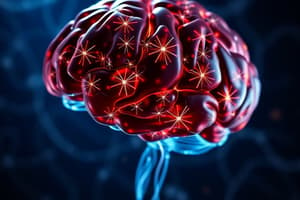Podcast
Questions and Answers
What is the fundamental unit of symbolic knowledge according to the passage?
What is the fundamental unit of symbolic knowledge according to the passage?
- Concept (correct)
- Mental model
- Representation
- Category
What is the main purpose of having concepts according to the passage?
What is the main purpose of having concepts according to the passage?
- To think about the outside world
- To remember things more efficiently (correct)
- To understand how people learn
- To treat objects as equivalent
How do concepts allow people to extend their knowledge to an infinite number of objects?
How do concepts allow people to extend their knowledge to an infinite number of objects?
- By understanding the core features of a limited number of objects (correct)
- By forming mental representations of categories
- By learning the shared characteristics of a category
- By recognizing patterns and generalizing to new situations
What is the difference between a category and a concept according to the passage?
What is the difference between a category and a concept according to the passage?
What is the key role of categories according to the passage?
What is the key role of categories according to the passage?
What is the main focus of the psychology of categories according to the passage?
What is the main focus of the psychology of categories according to the passage?
What is the main difference between well-defined and fuzzy categories?
What is the main difference between well-defined and fuzzy categories?
What is the key concept behind the idea of 'typicality' in categories?
What is the key concept behind the idea of 'typicality' in categories?
According to the passage, what is a key characteristic of fuzzy categories?
According to the passage, what is a key characteristic of fuzzy categories?
How do typical and atypical category members differ in terms of cognitive processing?
How do typical and atypical category members differ in terms of cognitive processing?
What does the passage suggest about the nature of category boundaries?
What does the passage suggest about the nature of category boundaries?
According to the passage, what is the primary reason it is difficult to define well-defined categories?
According to the passage, what is the primary reason it is difficult to define well-defined categories?
Flashcards are hidden until you start studying




